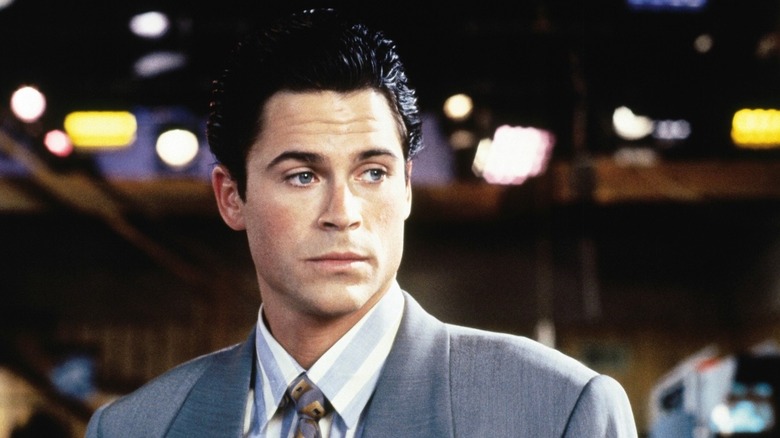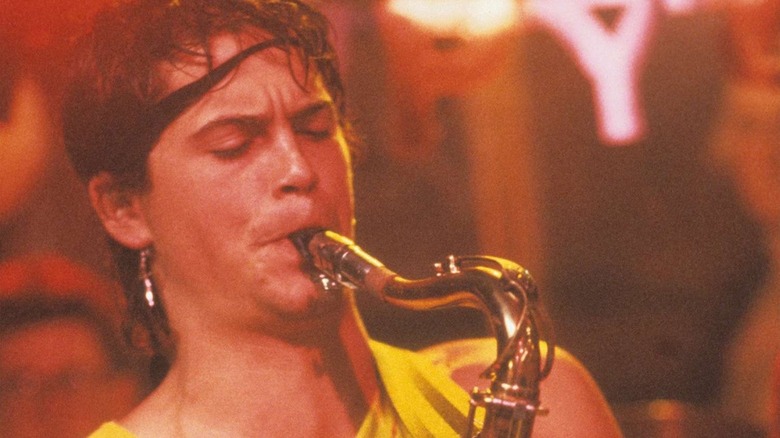This Iconic '80s Rob Lowe Film Defined A Generation Of Stars As Hollywood's Brat Pack
Every generation has its defining actors. Baby Boomers grew up flocking to the films of Warren Beatty, Faye Dunaway, Dustin Hoffman, Barbra Streisand, and so many others. Millennials fondly recall lining up for the latest movies starring Leonardo DiCaprio, Rachael Leigh Cook, Sarah Michelle Gellar, and Jason Biggs. And Zoomers will one day be nostalgic for the work of folks like Timothée Chalamet, Sydney Sweeney, Amber Midthunder, and Miles Caton.
As a Generation X kid, I had a front-row seat to one of the most strangely over-hyped big-screen talent pools of all time. Through no fault of their own, a group of (mostly) talented young performers rose to fame by appearing in several youth-skewing movies at a time when Hollywood was just figuring out how to target our demographic. They hooked us through MTV, and spoke to our suburbanite trials and tribulations. John Hughes was our materialistic bard. Jake Ryan was our manifest romantic destiny. And Rob Lowe was a golden god.
I don't think anyone realized there was a Hollywood youth movement afoot until the summer of 1984, when John Milius's "Red Dawn" reconfigured the teen comedy as a kill-the-Commies war fantasy. Suddenly, these wet-behind-the-ears kids were thrust into the real world of the Reagan era, which struck some culture journalists as a generational bid to be taken seriously.
This didn't sit well with the media smart set, so when they caught wind of Joel Schumacher's "St. Elmo's Fire," an ensemble drama set in the politically aspirational Washington D.C. bubble, knives were drawn. But rather than shiv the dubious melodrama concocted by Schumacher and Carl Kurlander, one New York magazine writer backstabbed the too-open, hard-partying stars. And thus the Brat Pack became a pop cultural phenomenon.
St. Elmo's Fire is a beloved melodrama that burned its stars
If you've seen Anthony McCarthy's squirm-fest documentary "Brats," you know that writer David Blum harbors no regrets over the New York magazine profile that coined the phrase "Brat Pack." If you've seen "St. Elmo's Fire" lately, you also know that the movie's a slickly directed piece of Hollywood hokum that has aged like a glass of uncorked table wine.
But the actors had a blast making it, and it seems, genuinely liked working with each other. They hit bars, lived it up, and crawled out from under their hangovers long enough to make a movie. Interestingly, Lowe was initially up for the role of political opportunist Alec Newberry (which eventually went to Judd Nelson), but he only had eyes for bad-boy musician Billy Hicks. As he told Entertainment Weekly in 2017, his instincts were spot on. Per Lowe:
"People love this movie, or we wouldn't be talking about it 32 years later. It is very kitschy and it's extremely dated. There is a lot of great stuff to hate-watch in it. But at the end of the day, when Billy Hicks gets on the bus and pulls away, you will cry."
Blum's piece did real damage to the careers of everyone in the movie. Emilio Estevez, Demi Moore, Mare Winningham, Ally Sheedy, Nelson, McCarthy, and Lowe were treated as cultural impostors for years to come. They're all very talented people who deserved better, but as Nelson told EW, "Acting in 'St. Elmo's' was clearly instrumental in my being included in, and branded negatively by, the fictional Brat Pack. Being portrayed as professionally irresponsible has diminished my opportunities." Blum should be ashamed.

